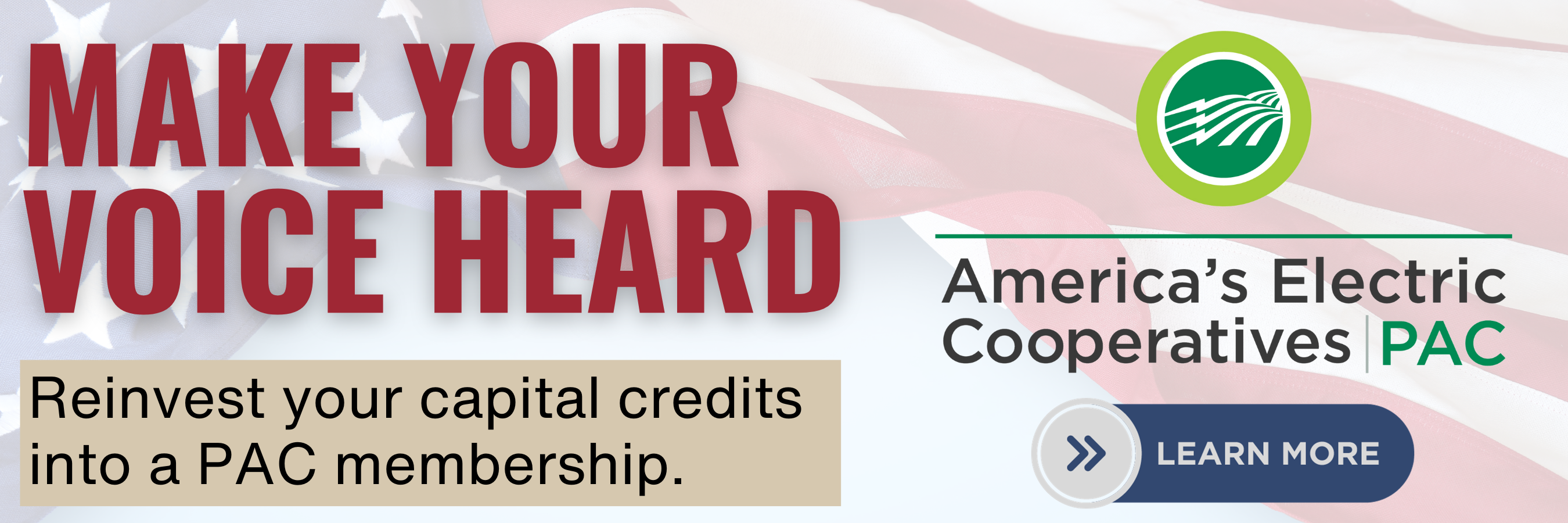
Join America's Electric Cooperatives PAC
By joining America's Electric Cooperatives PAC, you will support elected officials who will:
- Keep your energy bills affordable because it improves your quality of life.
- Help your cooperative keep your energy service reliable.
- Assist your efforts to use energy more efficiently.
- Make renewable energy more affordable for you.
- Help rebuild your cooperative after a storm.
- Protect our economy and jobs when making energy laws.
Click HERE to print a letter template for your local legislator. Mail it to support common sense energy policy! (Details below in the drop-down.)
Click here to view an informational brochure about America's Electric Cooperatives PAC, or use the enrollment form below to start making a DIFFERENCE.
America's Electric Cooperatives PAC gives you, the member-owner, the opportunity to use your voice on behalf of your cooperative. State and federal government officials make policy decisions that affect your local cooperative and your way of life. This program is an easy way for you to help determine who gets elected to make those decisions.
The America's Electric Cooperatives PAC® is the political action committee (PAC) of the nation’s electric cooperatives. Founded in 1966 by the approximately 1000 cooperatives of the National Rural Electric Cooperative Association (NRECA), it supports candidates for state and federal office – those in office now and running for office – who will speak for and protect the interests of cooperatives and their member-owners.
Your participation in the nationwide America's Electric Cooperatives PAC program ensures that the voice of cooperatives remains strong in our nation’s capital and in your state legislature. Maintaining a strong grassroots presence in the political process is instrumental to the long-term success of the cooperative program and the communities they serve in these unpredictable times.
What is a political action committee (PAC)?
The law allows individuals with common interests to pool their resources using PACs in order to make political contributions to candidates for state and federal office. Currently 33,000 like-minded supporters of the cooperative program combine their contributions through America's Electric Cooperatives PAC. Candidates who receive a substantial contribution from America's Electric Cooperatives PAC get an important message about your interest in your local community’s cooperative. The candidate knows that the cooperative member-owners and employees who supported them want to elect individuals to office who will make good policy decisions on their behalf.
Are contributions tax-deductible?
No. The Internal Revenue Service has ruled that all political contributions, such as those to America's Electric Cooperatives PAC®, are not tax deductible.
What do I receive for my contribution?
The most important benefit that you receive as an America's Electric Cooperatives PAC member is a voice in helping elect state and federal officials that will support your cooperative and your community. In addition, you will receive quarterly issues of the America's Electric Cooperatives PAC newsletter, which includes legislative alerts, profiles of cooperative leaders, and other timely features. You will also receive a quarterly e-newsletter from PPEC with local updates.
Where does my contribution go?
With the exception of a small federal tax payment of less than one percent, all contributions to America's Electric Cooperatives PAC go directly to the campaigns of candidates for political office. In addition, a portion of your contribution (about half) may be refunded to your state cooperative PAC to support candidates for state office.
Who determines how these contributions are made?
America's Electric Cooperatives PAC follows established procedures for making contributions to candidates running for political office. Factors that determine financial support include the candidate’s position on issues critical to cooperatives, the candidate’s committee assignments and leadership positions, his or her relative importance to cooperatives’, and a candidate’s financial need and the strength of his or her opponent. The candidate’s political affiliation is never taken into account.
Individual states have their own guidelines for making contributions to candidates for statewide offices. While these rules are set by the individual states, they often mirror those guidelines used by the America's Electric Cooperatives PAC.
Do I really make a difference?
Our ability to serve you and your community is heavily dependent on members like you who use America's Electric Cooperatives PAC to get the right people into political office. The personal dedication of member-owners to stand together forms the backbone of a powerful grassroots network that promotes policies to secure the future of your cooperative and the families they serve. This is an opportunity to make a huge difference. Please consider it!
Our power reliability is at risk due to our current U.S. energy policies, including increased demand, rapid retirement of baseload generation like coal-fired power plants, overreaching and unreasonable EPA regulations, supply chain issues, and poorly designed electricity market rules. Read more here and why rolling blackouts could be a possibility.
Help us convey to our state and local elected leaders that you support common sense energy policy.
- Find your local legislator below (there is a chart for both Ohio and Indiana members)
- Print this letter template (or write your own)
- Mail it to make our joint cooperative voice heard and help protect our reliability!
Ohio House |
Ohio Senate |
US Congress (Ohio) |
US Senate (Ohio) |
|
District 78 – Susan Manchester
|
District 1 – Rob McColley Senate Building |
Ohio District 4 – Jim Jordan
|
J.D. Vance B40C Dirksen Senate Office Building Washington, DC 20510 |
|
District 82 – Roy Klopfenstein Paulding, Putnam, Van Wert and part of Defiance county
|
District 12 – Matt Huffman
|
Sherrod Brown 713 Hart Senate Office Building Washington DC 20510 |
Indiana House |
Indiana Senate |
US Congress (Indiana) |
US Senate (Indiana) |
|
District 80 (Allen County) - State Rep Phil GiaQuinta 200 W. Washington St. |
District 19 (Allen & Adams counties) - State Sen. Travis Holdman 200 W Washington St. |
Indiana District 3 (Allen & Adams counties) - Rep Jim Banks 2418 Rayburn House Office Building Local office: |
Sen. Todd Young |
|
District 85 (Allen County) - State Rep Dave Heine 200 W. Washington St. |
District 14 (Allen County) - State Sen. Tyler Johnson 200 W Washington St. |
Sen. Mike Braun 404 Russell Senate Office Building Local office: |
|
|
District 79 (Adams County) - Matt Lehman 200 W. Washington St. |
Want to stay in the loop but not contribute financially? Sign up for periodic email newsletters with political action updates, lawmaker bios, community projects, legislation details, and other issues coming down the pipeline.
![]() Indiana members (monthly e-newsletter): https://action.indianaec.org/register-to-be-an-advocate/
Indiana members (monthly e-newsletter): https://action.indianaec.org/register-to-be-an-advocate/
![]() Ohio members (quarterly e-newsletter): https://forms.gle/Lat5sL8WdUD9nZqD6
Ohio members (quarterly e-newsletter): https://forms.gle/Lat5sL8WdUD9nZqD6
|
Contributions to the America's Electric Cooperatives PAC® are not tax deductible for federal income tax purposes. Contributions to America's Electric Cooperatives PAC are voluntary and will be used for political purposes. You have the right to refuse to contribute without reprisal. Federal law prohibits contributions from foreign nationals who lack permanent resident status. Any contribution guidelines presented are merely suggestions. You are free to contribute more or less than the suggested amounts, or not at all. NRECA will not favor or disadvantage anyone by reason of the amount contributed or a decision not to contribute. *Federal law requires us to use our best efforts to collect and report the name, mailing address, occupation and name of employer of individuals whose contributions exceed $200. |



